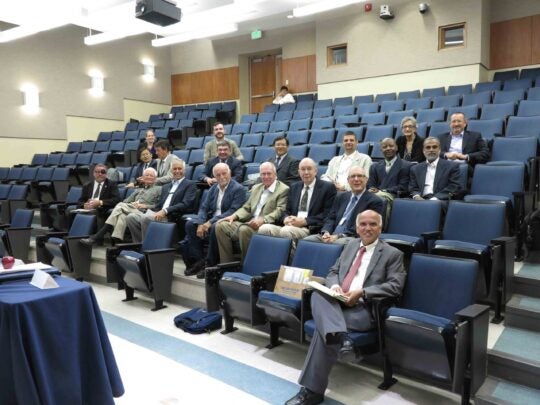July 21, 2014 at the University of Southern California
Concerns about atmospheric pollution and recent restrictions on the use of heavy fuel oil in the commercial maritime fleet in addition to the high cost and price fluctuations of these traditional fuels has inspired research that now shows promise for the use of alternatives. Moreover, implementation of International Convention on Prevention of Pollution from Ships (MARPOL) Annex VI as well as exhaust emission control areas now in the Baltic, the North Sea and North America and the prospect of additional emission control areas being designated around the world has inspired interest in these alternatives from the operators of the maritime fleet, coastal states, climate researchers, powerplant engineers, naval architects, chemists, air quality agencies and the public, all of whom have an interest in finding cleaner products to power the fleet, a fleet that transports more than 90% of internationally traded goods.
This meeting was a collaboration between the USC Sea Grant Program, the USC Loker Hydrocarbon Research Institute and USC’s Paul Hall Endowment for Marine Transportation Studies. The Loker Institute has studied methanol for many years, led by Professors George Olah and Surya G.K. Prakash whose book, Beyond Oil and Gas: The Methanol Economy, has inspired other researchers to examine how methanol might practically be substituted for traditional fuels. Olah and Prakash’s work demonstrates how a methanol economy could be uniquely sustainable solving vexing emission problems as well as being a cheaper and more reliable fuel for the future. USC Sea Grant was gratified to collaborate with this distinguished group of researchers and to help bring their findings to experts in the maritime field, an area in which Sea Grant has some longstanding expertise. It seemed to us that it would be useful to host a colloquium between fuel scientists and engineers who have designed and applied these new technologies, social scientists who explore how new technologies impact society and industry leaders and port managers who must simultaneously meet the needs of carriers using these new fuels as well as the concerns of the public.
The meeting explored three major themes: the nature of alternative fuels, both LNG and methanol; second, the engines and ships that will use these new fuels; and finally, the impact of using these new fuel types both on the economics of shipping and upon the seaports in which these fuels will be used.
The USC Sea Grant Program is particularly indebted to three distinguished individuals from the USC Loker Institute: Chemistry Nobel Laureate, Professor George Olah; Professor and Director of the Loker Institute Surya G.K. Prakash and Dr. Robert Aniszfeld. In a similar manner, we appreciated the willingness of our six speakers to travel long distances to help us explore this topic. Their presentations are available in pdf form in the sidebar and we hope that you will find them as enlightening as did our conference attendees.
Presentations and Resources
- G. K. Surya Prakash, “The Promise of Methanol”
- William Remley, “The International Energy Agency and Alternative Fuels”
- Paul Wuebben, “Practical Applications of Methanol Fuels”
- Dr. Dan Cohn, “Very High Efficiency Methanol Engines”
- Per Fagerlund, “Design of Vessels Using Alternative Fuels”
- Dr. Meifeng Luo, “The Economics of Alternative Fuels”
- Eric Caris and Carter Atkins, “The Seaport Perspective”
- Symposium Agenda
- Symposium Overview
Partners
USC’s Paul Hall Endowment for Marine Transportation Studies
Workshop Photos

